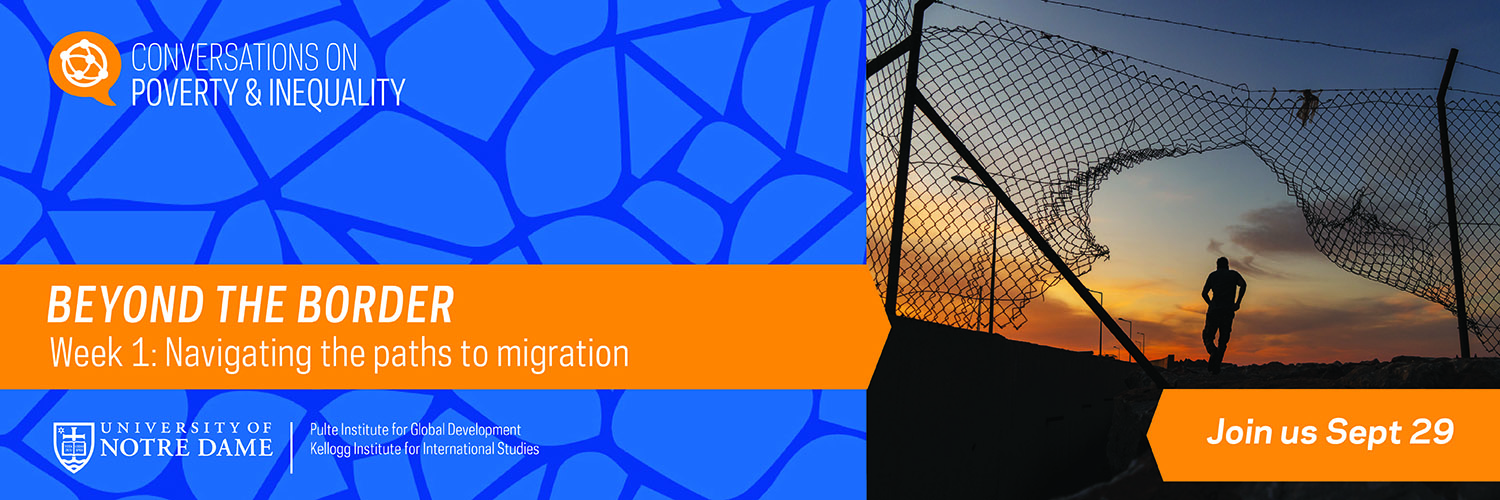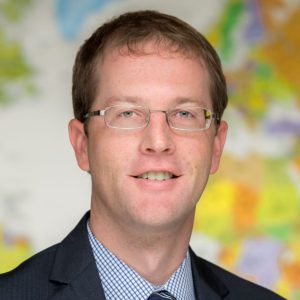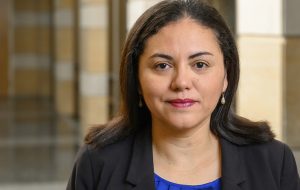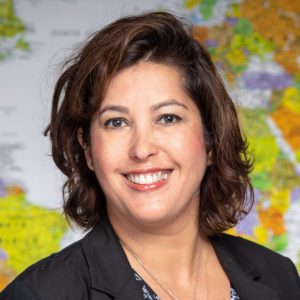Navigating the paths to migration

What is the current reality in Central America and why are people leaving the region? Global affairs experts will provide context to this question by giving an overview of the current levels of migration, its various drivers, and the different ways people and organizations are responding.
An Introduction to Migration from Central America
Presented by Tom Hare
Meet Tom Hare, a senior researcher at the Pulte Institute for Global Development and your host for the Beyond the Border series. Tom gives us a brief introduction to the issue of migration from Central America and sets us up for the series.
Host Welcome
Tom Hare
Senior Technical Associate
Pulte Institute for Global Development
 I first experienced the Central American region as an exchange student at the University of Central America in San Salvador. I vividly remember riding the bus from Mexico, through Guatemala to San Salvador, basically doing the typical migration route in reverse, passing volcanos, farms, cities, and people, and just taking in the beauty of it all from the bus window. I knew then that there was something special about the Central American region.
I first experienced the Central American region as an exchange student at the University of Central America in San Salvador. I vividly remember riding the bus from Mexico, through Guatemala to San Salvador, basically doing the typical migration route in reverse, passing volcanos, farms, cities, and people, and just taking in the beauty of it all from the bus window. I knew then that there was something special about the Central American region.
The program I studied with was based on a model of accompaniment and solidarity, so in addition to going to classes, we spent a couple of full days each week with a community just outside of the city. It was there that I met friends that I stay in touch with and visit twenty years later. That experience formed me in a way that few others in my life have — it made me curious to know more, to learn more, relate more and, eventually, do more. I think that is what led me here today, getting to know people and caring for them as friends, loving them as family, and then seeking to use my time, education, and experience to advocate for them.
It bears noting that the topic of migration can be a lightning rod for debate and entrenched views. Our purpose over the next few weeks is not to convince you of one viewpoint or another, but rather to inform. I believe that debates are healthiest when we present evidence and find some common ground. Given our position at a Catholic research and teaching institution, this is nothing new, but I encourage us to be open to each others’ viewpoints.
You will note that the program is intentionally titled “Beyond the Border,” and while we cannot ignore the real challenges of security and human rights at the border, our focus during this series is on the region and the realities that Central Americans face that are so difficult that many are forced to leave their homes in search of a better life elsewhere. I think we can all agree that promoting flourishing in the region is in everyone’s best interest.
I am excited to bring together some of the smartest, most dedicated people I know to discuss Central America with you all — including one of the first people I met when I stepped off of the bus in San Salvador twenty years ago. I’m glad you’ll be joining us.
Meet the Guest: Abby Córdova
Abby Córdova
Associate Professor of Global Affairs
Keough School of Global Affairs
 Abby Córdova is an associate professor of global affairs in the Keough School of Global Affairs, a faculty fellow of the Kellogg Institute for International Studies, and a research affiliate of the Kellogg Institute’s Notre Dame Violence and Transitional Justice Lab (V-TJ). Córdova’s research examines the consequences of inequality and marginalization for democracy, integrating topics related to crime and violence, gender inequality, economic inequality, and international migration in the context of Latin America and the Caribbean. Her research seeks to identify public policies that can improve the well-being of disadvantaged citizens and in this way advance democratic consolidation across the world.
Abby Córdova is an associate professor of global affairs in the Keough School of Global Affairs, a faculty fellow of the Kellogg Institute for International Studies, and a research affiliate of the Kellogg Institute’s Notre Dame Violence and Transitional Justice Lab (V-TJ). Córdova’s research examines the consequences of inequality and marginalization for democracy, integrating topics related to crime and violence, gender inequality, economic inequality, and international migration in the context of Latin America and the Caribbean. Her research seeks to identify public policies that can improve the well-being of disadvantaged citizens and in this way advance democratic consolidation across the world.
Meet the Guest: María Estela Rivero Fuentes
María Estela Rivero Fuentes
SHARE MEL-KM Director
Pulte Institute for Global Development
 María Estela Rivero Fuentes is the Monitoring, Evaluation, Learning, and Knowledge Management Director for the USAID-funded Supporting Holistic and Actionable Research in Education (SHARE) program. A social demographer by trade, Rivero Fuentes has over 20 years of experience evaluating social programs in Mexico, Central America, and the Caribbean; analyzing and collecting data; and conducting research on gender, migration, youth, and violence issues. Her excellent quantitative and qualitative skills, combined with her extensive experience and innovative creativity, have been instrumental for research teams seeking to improve social interventions and programs. Fluent in both Spanish and English, she has worked collaboratively across international and interdisciplinary teams in academia, international research organizations, and development agencies.
María Estela Rivero Fuentes is the Monitoring, Evaluation, Learning, and Knowledge Management Director for the USAID-funded Supporting Holistic and Actionable Research in Education (SHARE) program. A social demographer by trade, Rivero Fuentes has over 20 years of experience evaluating social programs in Mexico, Central America, and the Caribbean; analyzing and collecting data; and conducting research on gender, migration, youth, and violence issues. Her excellent quantitative and qualitative skills, combined with her extensive experience and innovative creativity, have been instrumental for research teams seeking to improve social interventions and programs. Fluent in both Spanish and English, she has worked collaboratively across international and interdisciplinary teams in academia, international research organizations, and development agencies.
Additional Resources
- Research Article: Hopelessness and Corruption: Overlooked Drivers of Migration from the Northern Triangle of Central America, Eric Olson and Joy Olson
- Research Article: Leaving the Devil You Know: Crime Victimization, US Deterrence Policy, and the Emigration Decision in Central America, Jonathan T. Hiskey, Abby Córdova, Mary Fran Malone, Diana M. Orcés
- Blog: The pandemic reveals truths old and new about migration from Central America, Clara Villatoro Huezo and Tom Hare in Dignity and Development
- Op-Ed: To address Central American migrants, the U.S. must confront its own past, Tom Hare and Hugo Noé Pino in The Hill
- Op-Ed: Ending assistance to Central America is morally shameful, Tom Hare and Ray Offenheiser in The Hill
View the Live Event
Subscribe to the ThinkND podcast on Apple, Spotify, or Google.
Featured Speakers:
- Tom Hare, Senior Technical Associate, Pulte Institute for Global Development
- Abby Córdova, Associate Professor of Global Affairs, Keough School of Global Affairs
- María Estela Rivero Fuentes, SHARE MEL-KM Director, Pulte Institute for Global Development
